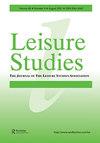Development of leisure scores according to mental, physical, and social components and investigation of their impacts on mental health
IF 2.3
2区 社会学
Q2 HOSPITALITY, LEISURE, SPORT & TOURISM
引用次数: 0
Abstract
ABSTRACTPerforming single leisure activity simultaneously requires mental, physical, and social effort. This research aimed to represent the extent of the three components using numerical scores and examined whether the scores are related to mental health. To determine the component scores, 1200 Japanese participants of varied ages chose activities they had ever experienced from 97 choices. They rated each of them regarding their mental, physical, and social efforts to perform it (0-none to 4-high). They also reported their level of psychological resilience and depressive symptoms. Based on the rating frequency, the three component scores for 86 activities were determined (few activities were removed during analysis). Then, a cluster analysis of the component scores classified those activities into 8 groups. Finally, the relationship between the component scores and mental health was examined. Each participant’s mental, physical, and social personal scores were calculated by adding the component score (e.g. mental score) of all the activities he/she rated. The individuals with high scores for all three components showed better mental health than those having fewer high-score components. The established scores should be helpful for future research, and it is revealed that exerting effort for all three components through leisure benefits mental health.KEYWORDS: Classificationcombination effectsleisure component scoremental healthrating evaluation AcknowledgementsTwo JSPS KAKENHI grants, Grant-in-Aid for Scientific Research (B) 19H01761 and Grant-in-Aid for Transformative Research Areas (A) 20H05803, and the 2020 Collaborative Research Support Program of Kanazawa University supported this work.Disclosure statementNo potential conflict of interest was reported by the author(s).Supplementary MaterialSupplemental data for this article can be accessed online at https://doi.org/10.1080/02614367.2023.2256027Notes1. Additional scrutiny of these participants revealed that those who rated no activity were predominantly in one of the following categories: older females, currently employed, and having offspring. Compared to the participants who rated some activities, they reported lower resilience and higher depression scores. The lower mental health scores can be the result of lacking leisure participation or the cause of it.Additional informationFundingThe work was supported by the Japan Society for the Promotion of Science [19H01761; 20H05803].Notes on contributorsYuta TakiguchiYuta Takiguch is a Postdoctoral Researcher in the Institute of the Liberal Arts and Science at Kanazawa University, Japan. In his research, he focuses on the long-term effect of lifetime activities, as well as the development of generalized trust and distrust.Mie MatsuiMie Matsui is a Professor of clinical neuropsychology in the Institute of Liberal Arts and Science at Kanazawa University. Her research has been in the study of brain and behavior in patients with schizophrenia and neurological disease. She has mainly focused on cognitive function and cognitive reserve in those patients and is also interested in cognitive remediation for them.Mariko KikutaniMariko Kikutani is an Associate Professor in the Institute of Liberal Arts and Science at Kanazawa University, Japan. Her research focuses on face perception, emotion recognition, psychology of language, and cross-cultural psychology. She is particularly interested in comparing emotion concepts across cultures.Kota EbinaKota Ebina is a Postdoctoral Researcher at the Institute of Liberal Arts and Science, Kanazawa University. His research interests are cognitive impairment in patients with schizophrenia and brain tumors.根据心理、身体和社会因素编制休闲评分,并调查其对心理健康的影响
【摘要】同时进行单一的休闲活动需要付出精神、身体和社会的努力。本研究旨在用数值分数来表示这三个组成部分的程度,并检验分数是否与心理健康有关。为了确定组成部分的分数,1200名不同年龄的日本参与者从97个选项中选择了他们曾经经历过的活动。他们对每个人的心理、身体和社会努力进行了评分(0- 0到4分)。他们还报告了他们的心理弹性水平和抑郁症状。根据评分频率,确定了86项活动的三个组成部分得分(在分析过程中删除了少数活动)。然后,对组成部分得分进行聚类分析,将这些活动分为8组。最后,分析各成分得分与心理健康的关系。每个参与者的心理、身体和社会个人得分是通过将他/她所评价的所有活动的组成分数(如心理得分)相加来计算的。在这三个方面得分较高的人比那些得分较低的人表现出更好的心理健康状况。研究结果表明,在休闲活动中努力完成这三个组成部分对心理健康有益。2项JSPS KAKENHI基金,科学研究资助(B) 19H01761和变革研究领域资助(A) 20H05803,以及金泽大学2020年合作研究支持计划支持本工作。披露声明作者未报告潜在的利益冲突。补充材料本文的补充数据可在https://doi.org/10.1080/02614367.2023.2256027Notes1上在线获取。对这些参与者的进一步审查显示,那些认为没有活动的人主要属于以下类别之一:年长的女性,目前在职的女性,有孩子的女性。与对某些活动进行评分的参与者相比,他们的恢复力较低,抑郁得分较高。较低的心理健康得分可能是缺乏休闲参与的结果,也可能是其原因。本研究得到了日本科学促进会的支持[19H01761;20 h05803]。yuta takiguchi,日本金泽大学文理研究所博士后研究员。在他的研究中,他关注终身活动的长期影响,以及广义信任和不信任的发展。松井Mie Matsui是金泽大学文理研究所的临床神经心理学教授。她的研究一直在研究精神分裂症和神经系统疾病患者的大脑和行为。她主要关注这些患者的认知功能和认知储备,并对他们的认知修复感兴趣。菊谷瑞子(Mariko Kikutani),日本金泽大学文理学院副教授。她的研究主要集中在面部感知、情感识别、语言心理学和跨文化心理学。她对比较不同文化的情感概念特别感兴趣。Kota Ebina是金泽大学文理研究所的博士后研究员。他的研究兴趣是精神分裂症和脑肿瘤患者的认知障碍。
本文章由计算机程序翻译,如有差异,请以英文原文为准。
求助全文
约1分钟内获得全文
求助全文
来源期刊

Leisure Studies
HOSPITALITY, LEISURE, SPORT & TOURISM-
CiteScore
4.90
自引率
14.30%
发文量
85
期刊介绍:
Leisure Studies publishes articles of a high standard on all aspects of leisure studies and from a variety of disciplinary bases, including sociology, psychology, human geography, planning, economics, etc. Shorter research notes and book reviews are also published. The emphasis of the Journal is on the social sciences, broadly defined, and the subjects covered include the whole range of leisure behaviour in the arts, sports, cultural and informal activities, tourism, urban and rural recreation.
 求助内容:
求助内容: 应助结果提醒方式:
应助结果提醒方式:


